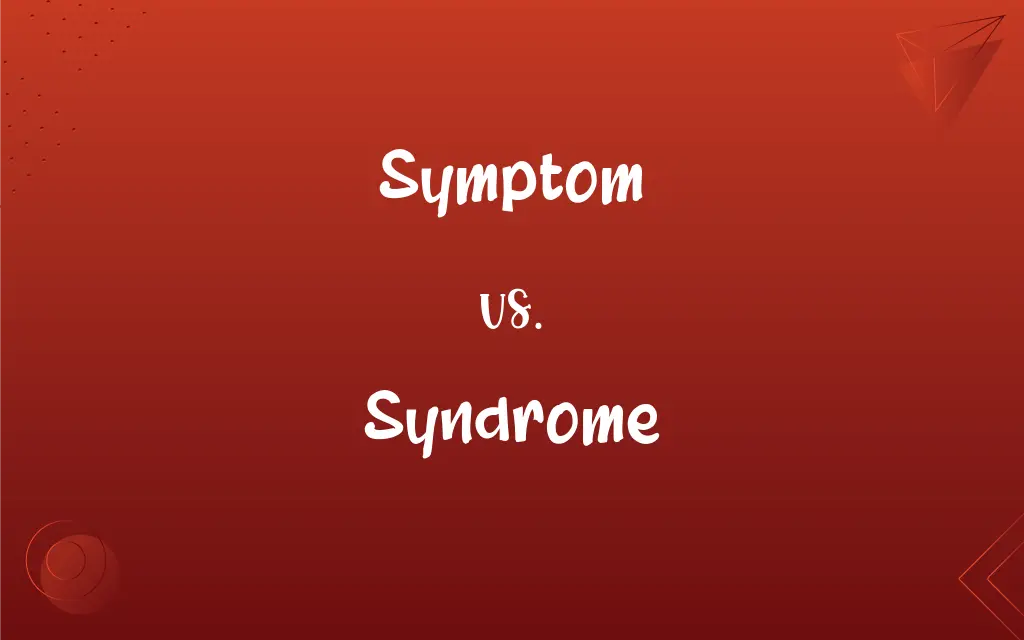Symptom vs. Syndrome: What's the Difference?
Edited by Aimie Carlson || By Janet White || Updated on October 7, 2023
A symptom is a sign of an illness or condition; a syndrome is a collection of symptoms characterizing a specific health disorder.

Key Differences
Symptom and Syndrome are terms used in medical contexts, yet they have distinct meanings. A symptom is an indication of a disease, condition, or ailment. It's the way the body manifests an abnormality or malfunction, signaling to the patient or healthcare professional that something might be wrong. For example, a fever might be a symptom of an infection.
In contrast, a syndrome is a group or cluster of symptoms that frequently appear together and are indicative of a particular disorder or condition. This means that if a person has a syndrome, they typically experience multiple symptoms that collectively point toward that specific medical condition. For instance, Down syndrome is characterized by a combination of distinct physical and developmental symptoms.
Symptom, as a term, tends to focus on individual manifestations. For example, a persistent cough can be a symptom of various conditions such as a cold, pneumonia, or even acid reflux. It's a singular indicator that doesn't necessarily tell the entire story of the patient's health.
On the other hand, syndrome brings a broader picture. When someone mentions a particular syndrome, it conjures up an array of symptoms associated with that condition. Using the example of Carpal Tunnel Syndrome, one doesn't just think of wrist pain, but also numbness, tingling, and other related symptoms.
In essence, while both symptom and syndrome pertain to health and illness, a symptom is a singular manifestation, while a syndrome encompasses a more comprehensive set of symptoms that define a particular condition.
ADVERTISEMENT
Comparison Chart
Definition
Sign or indication of a condition
Collection of related symptoms
Scope
Singular
Broader, multiple symptoms
Examples
Cough, Fever
Down syndrome, Carpal Tunnel Syndrome
Diagnostic significance
Indicates potential health issues
Defines a specific medical condition
Nature
Observable or felt condition
Recognizable pattern of symptoms
ADVERTISEMENT
Symptom and Syndrome Definitions
Symptom
An indication of a disease or disorder.
A high fever is a symptom of many infections.
Syndrome
A collection of interrelated symptoms characterizing a disorder.
Down syndrome is recognized by distinct facial features.
Symptom
A patient's reported or experienced abnormality.
She complained of a new symptom at her check-up.
Syndrome
A recognizable pattern in a medical context.
Metabolic syndrome involves obesity, hypertension, and more.
Symptom
An observable effect of an underlying problem.
Breathlessness is a symptom that shouldn't be ignored.
Syndrome
A complex of symptoms indicating a specific disease.
Carpal Tunnel Syndrome affects the hands and wrists.
Symptom
A single manifestation of a bigger issue.
He ignored the symptom and it got worse.
Syndrome
A set of concurrent things suggesting a particular problem.
His syndrome was challenging to diagnose due to its rarity.
Symptom
An indication of a disorder or disease, especially a subjective one such as pain, nausea, or weakness.
Syndrome
A group of symptoms that collectively indicate or characterize a disease, disorder, or other condition considered abnormal.
Symptom
A characteristic sign or indication of the existence of something else
Drought and erratic rainfall as symptoms of climate change.
Syndrome
A complex of symptoms indicating the existence of an undesirable condition or quality
Suffers from fear-of-success syndrome.
Symptom
(medicine) A perceived change in some function, sensation or appearance of a person that indicates a disease or disorder, such as fever, headache or rash; strictly, a symptom is felt or experienced by the patient, while a sign can be detected by an observer.
Swollen breasts, morning sickness, and a missed period are classic symptoms of pregnancy.
Syndrome
A distinctive or characteristic pattern of behavior
The syndrome of conspicuous consumption in wealthy suburbs.
Symptom
(figuratively) A signal; anything that indicates, or is characteristic of, the presence of something else, especially of something undesirable.
Lying, hiding one's true feelings, and having affairs are typical symptoms of a doomed marriage.
Syndrome
A group of anatomical and often physiological characteristics of an organism that serve a specific function and are presumed to have evolved together
The angiosperm reproductive syndrome.
Symptom
Any affection which accompanies disease; a perceptible change in the body or its functions, which indicates disease, or the kind or phases of disease; as, the causes of disease often lie beyond our sight, but we learn their nature by the symptoms exhibited.
Like the sick man, we are expiring with all sorts of good symptoms.
Syndrome
(pathology) A recognizable pattern of signs, symptoms and/or behaviours, especially of a disease or medical or psychological condition.
Down syndrome; acquired immune deficiency syndrome; restless-leg syndrome; battered-wife syndrome
Symptom
A sign or token; that which indicates the existence of something else; as, corruption in elections is a symptom of the decay of public virtue.
Syndrome
Any set of characteristics regarded as identifying a certain type, condition, etc., usually adverse.
Not-in-my-backyard syndrome; tip-of-the-tongue syndrome
Symptom
(medicine) any sensation or change in bodily function that is experienced by a patient and is associated with a particular disease
Syndrome
Concurrence.
Symptom
Anything that accompanies X and is regarded as an indication of X's existence
Syndrome
A group of symptoms occurring together that are characteristic and indicative of some underlying cause, such as a disease.
Symptom
A physical or mental feature suggesting a condition.
Fatigue is a common symptom in various illnesses.
Syndrome
Generally, a pattern of characteristics or behaviors occurring together, that are sufficiently common and distinctive to indicate that they are due to a known cause.
Syndrome
A complex of concurrent things;
Every word has a syndrome of meanings
Syndrome
A pattern of symptoms indicative of some disease
Syndrome
A group of signs and symptoms that together indicate a particular condition.
The doctor diagnosed her syndrome after a series of tests.
FAQs
Can a symptom exist independently?
Yes, a symptom can exist independently and can be an indicator of multiple conditions.
Does a syndrome always have a known cause?
Not always. Some syndromes have unknown etiologies.
How many symptoms make up a syndrome?
There's no fixed number; a syndrome is a recognizable pattern of symptoms.
Is "Irritable Bowel Syndrome" a disease or a set of symptoms?
It's a syndrome characterized by a group of gastrointestinal symptoms.
How is a syndrome different from a symptom?
A syndrome is a collection of interrelated symptoms characterizing a disorder.
Is a syndrome always related to diseases?
Mostly, but it can also refer to a recognizable pattern in non-medical contexts.
Are all symptoms indicative of serious health issues?
Not always; symptoms can range from mild to severe.
What is a symptom?
A symptom is a sign or indication of a disease or disorder.
Can a cough be both a symptom and a syndrome?
A cough is a symptom. When combined with other symptoms, it might be part of a syndrome.
Do all patients with the same syndrome experience the same symptoms?
Not necessarily; the expression of a syndrome can vary among individuals.
How are symptoms identified?
Through patient reports, clinical examinations, and diagnostic tests.
Are symptoms subjective or objective?
They can be both. Some symptoms are felt (subjective) while others are observable (objective).
How do doctors differentiate between symptoms and syndromes?
Doctors look at the overall clinical picture, using symptoms to identify potential syndromes.
Are fatigue and tiredness the same symptom?
They are similar but can have different underlying causes.
How are syndromes named?
Often by their discoverer, characteristic features, or underlying cause.
Can one symptom be part of multiple syndromes?
Yes, a symptom can be indicative of various syndromes.
Can lifestyle changes alleviate symptoms?
In some cases, lifestyle changes can help manage or reduce symptoms.
Is "Restless Leg Syndrome" a symptom or a syndrome?
It's a syndrome characterized by an urge to move the legs.
Are all syndromes hereditary?
No, but some syndromes have a genetic component.
Can symptoms change over time?
Yes, symptoms can evolve or vary in intensity as conditions progress or change.
About Author
Written by
Janet WhiteJanet White has been an esteemed writer and blogger for Difference Wiki. Holding a Master's degree in Science and Medical Journalism from the prestigious Boston University, she has consistently demonstrated her expertise and passion for her field. When she's not immersed in her work, Janet relishes her time exercising, delving into a good book, and cherishing moments with friends and family.
Edited by
Aimie CarlsonAimie Carlson, holding a master's degree in English literature, is a fervent English language enthusiast. She lends her writing talents to Difference Wiki, a prominent website that specializes in comparisons, offering readers insightful analyses that both captivate and inform.































































